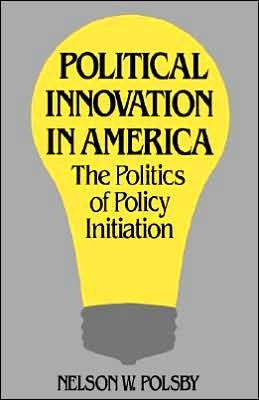By Edgar Wilson –
As popular as it has become (frankly, it has crossed the threshold to cliché) to compare governance to private-sector business management, America’s selection of would-be Manager-Politicians routinely fail to grasp the single most dynamic force of business today: innovation.

It isn’t entirely their fault. By design, America’s political structure is slow moving and change-resistant, and enacting any new policy requires patience and persistence more than startup minded nimbleness and enthusiasm for anything new. It is easier to stay the course than to rapidly adjust it. There again, the struggles of large businesses to change in response to, say, disruptive technologies or emerging consumer trends, parallel the government’s clunky adjustments in the face of changing political attitudes or the realities of a globally connected marketplace.

But if the size and structural weight of government keeps it from being maneuverable, what stops politicians themselves from thinking more creatively, and bringing more innovative ideas, proposals, and messages to their roles?
“Venture capital is responsible for only 3 percent of corporate research and development, but responsible for 10 percent of innovation,” explains Robert Mooradian, Professor of Finance at Northeastern University.
In other words, the pioneers who drive real change do so outside of the mainstream; once ideas have been tested, they are shifted out of the margins and into the public eye. The risk and promise of new ideas can seem a little too risky for those in a position to support change to actually throw their support behind genuine innovation.
“These big corporate structures don’t do as well in terms of getting new innovations started, in terms of developing new innovations,” continues Mooradian. So instead, they seek out venture-backed projects for acquisition—after the initial risk has had a trial period.
That may go some way to explaining why, in the 2016 presidential contest, there has been a trend of support for politicians viewed as outside the mainstream. In an environment that seems to demand creative solutions and innovative thinking, the risk-averse establishment seems to come up short. Like any corporation, it is easier for them to acquire ideas after they have been field-tested by someone else, and gained popular acceptance.
This paradox is at the core of the 2016 elections: people want innovation, but the system is designed for self-preservation. There is hunger for better solutions and better discourse, yet partisan forces are reluctant to reward candidates running beneath either banner for eschewing conventional party wisdom.
If voters are shareholders in the stock of their government, this means there is demand for innovation that isn’t being entirely reflected by boardroom decisions. Bringing young blood—or at least, new blood—into the company of these power brokers may be satisfying to the masses, but it hardly guarantees innovation will survive.
In the federalist structure of the United States, innovation ultimately won’t come from Washington; it will come from local government, the nearest thing we have to a small-scaled enterprise which can experiment with new policies, programs, and governance and field-test new ideas before they get picked up by the larger bodies. As Silicon Valley’s unicorns have taught us, big money starts out as big ideas, until it captures the attention of enough of the right people.
Politicians under greater scrutiny lack either the will or the capacity to be innovative, so like the garage-based startup, our best political hopes may turn out to be hiding in our own quiet neighborhoods.
Before you continue, I’d like to ask if you could support our independent journalism as we head into one of the most critical news periods of our time in 2024.
The New American Journal is deeply dedicated to uncovering the escalating threats to our democracy and holding those in power accountable. With a turbulent presidential race and the possibility of an even more extreme Trump presidency on the horizon, the need for independent, credible journalism that emphasizes the importance of the upcoming election for our nation and planet has never been greater.
However, a small group of billionaire owners control a significant portion of the information that reaches the public. We are different. We don’t have a billionaire owner or shareholders. Our journalism is created to serve the public interest, not to generate profit. Unlike much of the U.S. media, which often falls into the trap of false equivalence in the name of neutrality, we strive to highlight the lies of powerful individuals and institutions, showing how misinformation and demagoguery can harm democracy.
Our journalists provide context, investigate, and bring to light the critical stories of our time, from election integrity threats to the worsening climate crisis and complex international conflicts. As a news organization with a strong voice, we offer a unique, outsider perspective that is often missing in American media.
Thanks to our unique reader-supported model, you can access the New American journal without encountering a paywall. This is possible because of readers like you. Your support keeps us independent, free from external influences, and accessible to everyone, regardless of their ability to pay for news.
Please help if you can.
American journalists need your help more than ever as forces amass against the free press and democracy itself. We must not let the crypto-fascists and the AI bots take over.
See the latest GoFundMe campaign here.
Don't forget to listen to the new song and video.
Just because we are not featured on cable TV news talk shows, or TikTok videos, does not mean we are not getting out there in search engines and social media sites. We consistently get over a million hits a month.
Click to Advertise Here














